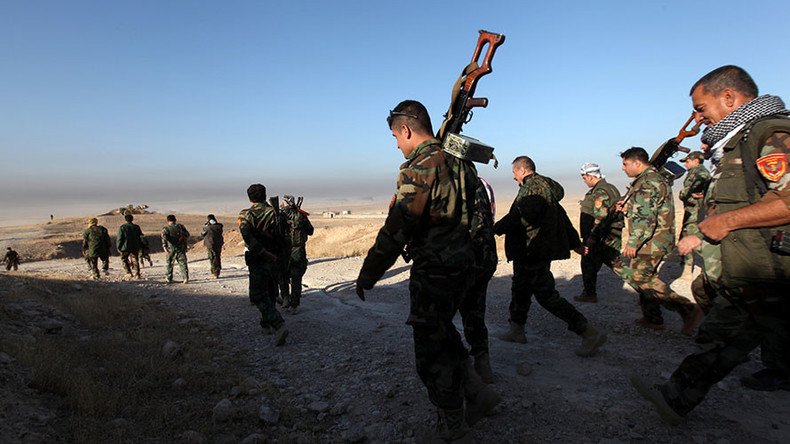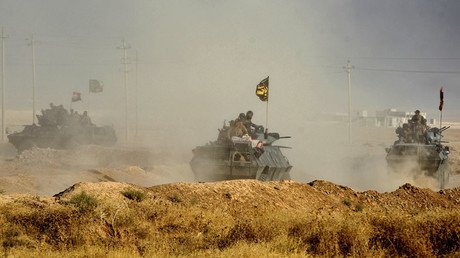Iraqi forces gain ground around Mosul in 1st day of US-backed offensive

Iraqi-Kurdish forces say they are pressing towards Mosul, an Islamic State stronghold in northern Iraq, while UNICEF warns that the offensive risks displacing over 500,000 people, which would push the UN’s capacity to supply aid over the limit.
Kurdish Peshmerga fighters have claimed significant territorial gains in the first day of the operation to retake Mosul.
“In less than 24 hours nine villages were cleared in an area measuring approximately 200 square kilometers (80 square miles),” the Peshmerga’s General Command claimed in a statement on Monday, adding that the Kurds were being backed from the air by US-led coalition forces, which hit 17 Islamic State (IS, formerly ISIS/ISIL) targets, destroying at least four vehicles rigged with explosives.
READ MORE: US, Saudis to grant 9,000 ISIS fighters free passage from Iraqi Mosul to Syria – source
“The operations in east and south Mosul are in coordination with Iraqi Security Forces in a shared effort to clear ISIL from Ninevah province,” the statement added, noting that the Peshmerga have also taken a “significant stretch of the Erbil-Mosul road.” Erbil, which is located some 350 kilometers (220 miles) from Baghdad and some 80 kilometers (50 miles) from Mosul, is the capital of Iraqi Kurdistan.
While some of the villages comprise just a few dozen houses and were generally empty, the main challenge for the Peshmerga spearheading the offensive has been to avoid booby traps and suicide car bombers.
‘Time of victory has come’: Iraq launches operation to retake Mosul from ISIShttps://t.co/VMg5Rt3ToW
— RT (@RT_com) 17 октября 2016 г.
IS claims to have carried out eight suicide attacks on Kurdish forces in just the first day of the large-scale military operation, and an unnamed Peshmerga major told AP that his fighters are afraid to step out of their vehicles.
Nevertheless, they managed to move the frontline eight kilometers (five miles) closer to IS positions during the first day of the offensive.
With some Kurdish units stopping just some 30 kilometers (20 miles) short of Mosul, the head of Iraq’s Kurdish region, Massoud Barzani, hailed the start of the military campaign as a success, saying the territorial gains marked a “turning point in the war against terrorism.”
Under an agreement with Iraqi authorities, the Kurdish forces that are leading the effort will be entitled to retain control of the villages they liberate, according to Iraqi special forces Lieutenant Colonel Ali Hussein, as cited by AP. Barzani refrained from speaking about long-term plans for governing the region, however, stressing that the Peshmerga units were not going to enter Mosul.
READ MORE: Pro-govt Iraq fighters ‘likely’ killed in coalition airstrike near Mosul – US official
Over 25,000 Iraqi troops, consisting of Kurdish as well as Sunni and Shiite militias, are taking part in the campaign to retake the city from the Islamic State militants that have maintained a grip on it since June of 2014. Local forces have been receiving constant support from the US-led coalition, which has provided advice and training to Iraqi army servicemen.
Speaking at a press briefing on Monday, White House spokesman John Earnest downplayed US involvement, saying that it is the Iraqi government that set the timetable for the operation and has been directing the situation on the ground, while noting that it will also be in charge of the future security situation in the region.
Up to 700,000 civilians to be displaced – UN
As the offensive gains momentum, international human rights organizations have begun to raise concerns about the looming humanitarian catastrophe that could be left in its wake, with UNICEF estimating that from 1.2 to 1.5 million civilians who live in densely populated Mosul, Iraq’s second largest city, could be at risk.
Lise Grande, Deputy Special Representative of the United Nations Assistance Mission for Iraq, said on Monday that as many as 700,000 civilians may be in need of shelter in the first few weeks of the offensive, which would exceed the UN’s current ability to provide aid by more than ten times. More cautious estimates put the number of civilians who could be potentially displaced at 200,000.
“Our capacity to support 700,000 people in the short-term – we couldn’t do it. And certainly if we had to mount a response over the intermediate-term, if they couldn’t go back to Mosul quickly, if there was too much damage in the city, then it would test us to breaking point,” she said, speaking from Iraq, as cited by AP.
“The challenges in this scenario are unprecedented. We don’t often have up to one million people potentially on the move; it’s very rare in scale and size,” said the organization’s regional emergency advisor, Bastien Vigneau.
The organization states that over half a million children and their relatives could find themselves “at extreme risk” over the next few weeks, adding that it is ready to immediately distribute hygiene, water, and other supplies to some 150,000 people and intends to stock up enough to help over 350,000 people.
It is likely that the terrorists in Mosul will try to prevent civilians from fleeing the besieged city in order to use them as human shields, Earnest said.
READ MORE: ISIS crushes Mosul rebellion, executes 58 plotters – report
“We would anticipate that they will not hesitate to put innocent civilians in harm’s way in an effort to protect that city and they’ll use a range of what we anticipate will be some deeply unethical and dangerous tactics to try to hold on to that city,” he said, insisting that, despite the dire threat to civilian lives, the Iraqi government should move forward with the operation.
“They’re killing civilians all the time. So the idea that somehow the Iraqi security forces should delay this operation because of their concern about the humanitarian situation in Mosul, that doesn’t make sense.”













